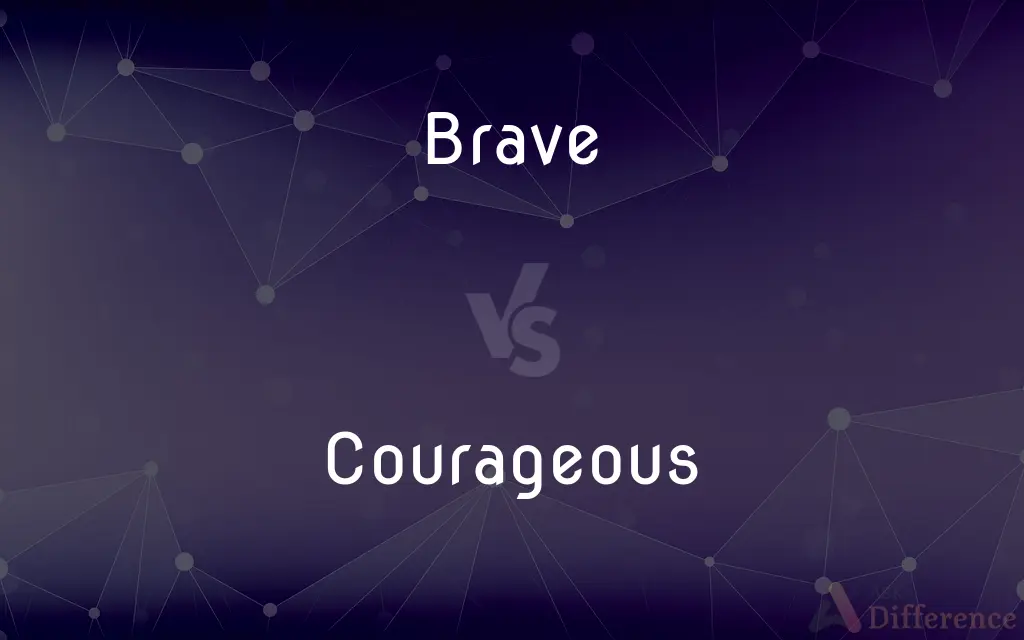Brave vs. Courageous — What's the Difference?
By Tayyaba Rehman & Urooj Arif — Updated on March 11, 2024
Brave involves facing danger or pain without showing fear, often impulsively, while courageous acts involve deliberate decisions to confront fear, pain, or challenges.

Difference Between Brave and Courageous
Table of Contents
ADVERTISEMENT
Key Differences
Bravery is often seen in the heat of the moment, a spontaneous reaction to an immediate threat or challenge, showing a willingness to face danger or endure pain without showing fear. Courageousness, on the other hand, involves a more deliberate, thoughtful decision to confront fear, challenges, or difficulties, often after careful consideration of the risks and consequences.
Bravery can sometimes be seen as a lack of fear, where an individual acts without hesitation, possibly due to instinct or a natural disposition. Courageousness, however, acknowledges fear and confronts it head-on, indicating a strength of character that allows one to act despite being afraid.
In many contexts, bravery is associated with physical actions, such as a soldier charging into battle or a firefighter rushing into a burning building. Courageousness extends beyond physical acts to include moral and emotional challenges, like standing up for one's beliefs or opening up about personal struggles.
While bravery can sometimes be considered reckless or impulsive when actions are taken without regard for safety or consequences, courageousness is often viewed as a more calculated risk, where the benefits of facing a fear are weighed against the potential dangers.
Both bravery and courageousness are admired qualities, but courageousness is often seen as more encompassing, involving not only physical risks but also moral and emotional dimensions. This makes courageous acts potentially more impactful, as they can inspire change and foster growth on a personal and societal level.
ADVERTISEMENT
Comparison Chart
Nature of Action
Spontaneous, often instinctive
Deliberate, thoughtful
Relationship with Fear
May act without showing or acknowledging fear
Acknowledges fear and chooses to face it
Scope
Often associated with physical actions
Includes physical, moral, and emotional challenges
Perception
Can be seen as reckless if not considered carefully
Seen as calculated and admirable
Impact
Primarily personal, immediate
Broader, can inspire change and growth
Compare with Definitions
Brave
Ready to face and endure danger or pain.
She was brave enough to walk through the dark forest alone.
Courageous
Not deterred by danger or pain.
The courageous leader stood firm in the face of adversity.
Brave
Not showing fear in the face of danger.
Despite the threat, he remained brave.
Courageous
Demonstrating courage, especially in difficult situations.
It was courageous of her to speak the truth.
Brave
Enduring or facing unpleasant conditions without showing fear.
She gave a brave smile despite her pain.
Courageous
Facing and dealing with anything recognized as dangerous or difficult.
He showed a courageous heart during the crisis.
Brave
Showing courage.
The brave firefighter saved the child from the burning house.
Courageous
Having the mental or moral strength to venture, persevere, and withstand danger.
Her courageous stance inspired others.
Brave
Acting without regard to dangers or consequences.
He made a brave decision to stand up to the bullies.
Courageous
Making deliberate decisions to confront fears or challenges.
It was a courageous decision to pursue his dreams despite the risks.
Brave
Possessing or displaying courage.
Courageous
Having or characterized by courage; valiant.
Brave
Making a fine display; impressive or showy
“a coat of brave red lipstick on a mouth so wrinkled that it didn't even have a clear outline” (Anne Tyler).
Courageous
Of a person, displaying or possessing courage. Category:en:Personality
The most courageous person I have ever met
Brave
Excellent; great
“The Romans were like brothers / In the brave days of old” (Thomas Macaulay).
Courageous
Of an action, that requires courage.
A courageous deed
Brave
(used with a pl. verb) People who exhibit bravery or courage considered as a group
“O'er the land of the free / And the home of the brave” (Francis Scott Key).
Courageous
Possessing, or characterized by, courage; brave; bold.
With this victory, the women became most courageous and proud, and the men waxed . . . fearful and desperate.
Brave
(Offensive) A Native American warrior.
Courageous
Possessing or displaying courage; able to face and deal with danger or fear without flinching;
Familiarity with danger makes a brave man braver but less daring
A frank courageous heart...triumphed over pain
Set a courageous example by leading them safely into and out of enemy-held territory
Brave
(Archaic) A bully.
Brave
To endure or face courageously
“He remained in his tent on inclement mornings while others in the party braved the rain ... looking for birds” (Bert O. States). “Together they would brave Satan and all his legions” (Emily Brontë).
Brave
(Obsolete) To make showy or splendid.
Brave
To make a courageous show or put up a stalwart front.
Brave
Strong in the face of fear; courageous.
Brave
(obsolete) Having any sort of superiority or excellence.
Brave
Making a fine show or display.
Brave
Foolish or unwise.
Brave
(dated) A Native American warrior.
Brave
(obsolete) A man daring beyond discretion; a bully.
Brave
(obsolete) A challenge; a defiance; bravado.
Brave
(transitive) To encounter with courage and fortitude, to defy, to provoke.
After braving tricks on the high-dive, he braved a jump off the first diving platform.
Brave
To adorn; to make fine or showy.
Brave
Bold; courageous; daring; intrepid; - opposed to cowardly; as, a brave man; a brave act.
Brave
Having any sort of superiority or excellence; - especially such as in conspicuous.
Iron is a brave commodity where wood aboundeth.
It being a brave day, I walked to Whitehall.
Brave
Making a fine show or display.
Wear my dagger with the braver grace.
For I have gold, and therefore will be brave.In silks I'll rattle it of every color.
Frog and lizard in holiday coatsAnd turtle brave in his golden spots.
Brave
A brave person; one who is daring.
The star-spangled banner, O,long may it waveO'er the land of the free and the home of the brave.
Brave
Specifically, an Indian warrior.
Brave
A man daring beyond discretion; a bully.
Hot braves like thee may fight.
Brave
A challenge; a defiance; bravado.
Demetrius, thou dost overween in all;And so in this, to bear me down with braves.
Brave
To encounter with courage and fortitude; to set at defiance; to defy; to dare.
These I can brave, but those I can not bear.
Brave
To adorn; to make fine or showy.
Thou [a tailor whom Grunio was browbeating] hast braved meny men; brave not me; I'll neither be faced or braved.
Brave
A North American Indian warrior
Brave
People who are brave;
The home of the free and the brave
Brave
Face or endure with courage;
She braved the elements
Brave
Possessing or displaying courage; able to face and deal with danger or fear without flinching;
Familiarity with danger makes a brave man braver but less daring
A frank courageous heart...triumphed over pain
Set a courageous example by leading them safely into and out of enemy-held territory
Brave
Invulnerable to fear or intimidation;
Audacious explorers
Fearless reporters and photographers
Intrepid pioneers
Brave
Brightly colored and showy;
Girls decked out in brave new dresses
Brave banners flying
`braw' is a Scottish word
A dress a bit too gay for her years
Birds with gay plumage
Common Curiosities
Is courageousness only related to moral and emotional challenges?
While courageousness includes moral and emotional challenges, it also encompasses physical challenges, making it broader in scope than bravery.
What is the main difference between being brave and being courageous?
Being brave often involves a spontaneous reaction to danger without showing fear, while being courageous involves a deliberate decision to face and overcome fear or challenges.
Can someone be brave without being courageous?
Yes, someone can act bravely in a moment without necessarily making a thoughtful decision to face and overcome fear, which would be considered courageous.
Can bravery be considered reckless?
Yes, bravery can sometimes be seen as reckless if actions are taken impulsively without considering the consequences or safety.
Are bravery and courageousness culturally defined?
Cultural contexts can influence perceptions of bravery and courageousness, with different societies valuing different aspects of these qualities.
Is it possible to develop bravery or courageousness?
Yes, both qualities can be developed through experiences, reflection, and deliberately facing and overcoming fears and challenges.
Is one quality more important than the other?
Neither is inherently more important; the value of bravery or courageousness depends on the context and the nature of the challenges faced.
How do bravery and courageousness impact others?
Both can inspire others, but courageous acts, which often involve moral or emotional dimensions, can have a broader impact, fostering change and personal growth.
Can a small act be considered courageous?
Yes, even small acts can be courageous if they involve deliberate decisions to face fears or challenges, regardless of the scale.
How do bravery and courageousness relate to fear?
Bravery might involve acting without showing fear, while courageousness involves acknowledging and choosing to confront fear.
Share Your Discovery

Previous Comparison
Acre vs. Feddan
Next Comparison
Hacienda vs. MansionAuthor Spotlight
Written by
Tayyaba RehmanTayyaba Rehman is a distinguished writer, currently serving as a primary contributor to askdifference.com. As a researcher in semantics and etymology, Tayyaba's passion for the complexity of languages and their distinctions has found a perfect home on the platform. Tayyaba delves into the intricacies of language, distinguishing between commonly confused words and phrases, thereby providing clarity for readers worldwide.
Co-written by
Urooj ArifUrooj is a skilled content writer at Ask Difference, known for her exceptional ability to simplify complex topics into engaging and informative content. With a passion for research and a flair for clear, concise writing, she consistently delivers articles that resonate with our diverse audience.














































